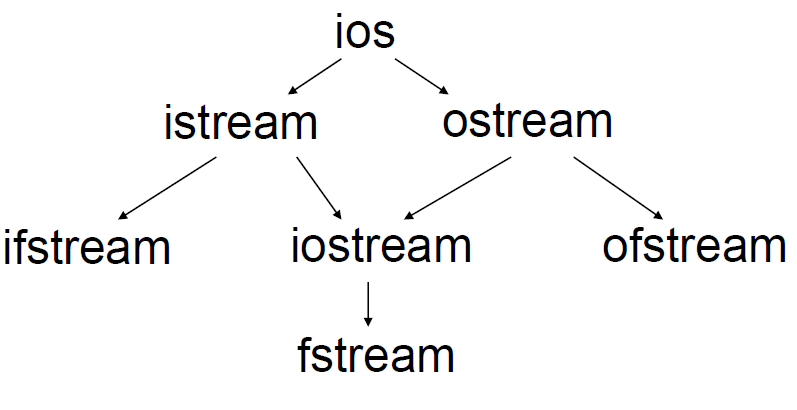输入输出流
- 输入输出类派生关系

-
标准流对象
- 标准输入流:
cin——与标准输入设备相连,istream对象 - 标准输出流:
cout——与标准输出设备相连,ostream对象
cerr——与标准错误输出设备相连(无缓冲区,直接屏显)
clog——与标准错误输出设备相连(有缓冲区)
- 标准输入流:
-
重定向
freopen("test.txt","w",stdout); freopen("test.txt","r",stdin); -
istream类成员函数istream& getline(char* str,int MaxSize,char delim=' ')从标准输入流中读取MaxSize-1个字符,或者遇到默认的换行符int peek()查看输入流首个字符,但不从流中取出istream& putback(char c)将字符c放置到输入流首部istream& ignore(int num=1,char delim=EOF)从输入流中删掉前num个字符,或遇到分隔符为止
-
输入控制
while(cin>>x){} //istream对象内对强制类型转换符bool进行了重载,具有了判断功能 if(!cin.getline(str,size)){}
流操作算子**
-
十进制
dec(默认),oct(八进制),hex(十六进制) -
设置宽度
setw(int n)或cin.width(int n);——设置后是一次性的,可用于cin -
设置浮点数精度
setprecision(int n)或cout.precision(int n);- 默认不定点方式,保留有效位数(可能采用科学计数法)
- 使用
fixed或setiosflag(ios::fixed)后则采用定点方式,保留小数点位数(用resetiosflag(ios::fixed)取消
-
对齐方式:
left、right -
显示正号+:
showpos;取消显示正号:noshowpos -
补齐字符
setfill(char c); -
科学计数法:
scientific -
实现原理
//ostream里对<<进行了重载,函数内部会调用p所指的函数,并以*this为参数,即cout ostream& operator<< (ostream& (*p)(ostream&)); //用户自定义流操作算子 ostream& tab(ostream& output){ return output<<' '; }
文件读写
-
需包含头文件
<fstream> -
因为
ifstream和ofstream分别是istream和ostream的派生类,所以也能使用cin和cout的成员函数 -
示例
ifstream fin("input.dat",ios::in|ios::binary); //以二进制方式打开文件用于读取数据 ifstream fin; fin.open("input.dat",ios::in|ios::binary); //Another way to open file ofstream fout("C:\tmp\output.txt",ios::out|ios::app); //打开字符文件以追加输出数据 if(!fout){ cout<<"File cannot be opened!"<<endl; return 0; } int location=fin.tellg(); //获取读指针的位置(相对于文件开头的字节偏移量) fin.seekg(location,ios::beg); //将读指针相对文件开头(begin)偏移location个字节 fin.seekg(location,ios::cur); //相对于当前位置(current)偏移 fin.seekg(location,ios::end); //相对于文件尾部(end)偏移 location=fout.tellp(); //写指针当前位置 fout.seekp(location,ios::beg); //seekg为读指针(get),seekp为写指针(print) fin.close(); fout.close(); -
文件路径
"C:\tmp\output.txt" //绝对路径 //相对路径: "\tmp\output.txt" //当前盘符根目录下的tmp文件夹下的文件 "tmp\output.txt" //当前文件夹下tmp文件夹下的output.txt文件 "..\..\tmp\output.txt" //当前文件夹下的父文件夹的父文件夹下的tmp里的output.txt -
二进制文件读写
-
read(char* str,int size);和write(char *str,int size),将size个字符读取/写入str处(遇文件结尾停止) -
gcount()显示read读取的字符数,get(char c)从文件流读取一个字符,put(char c)输出一个字符到文件流 -
#include<fstream> #include<iostream> using namespace std; struct Stu{ char name[20]; int score; }s; int main(){ ofstream fout("Student.dat",ios::out|ios::binary); //Open binary file for writing if(!fout){ cout<<"Error!"<<endl; return 0; } while(cin>>s.name>>s.score) fout.write((char*) &s,sizeof(s)); //write binary data fout.close(); ifstream fin("Student.dat",ios::in|ios::binary); //Open binary file for reading while(fin.read((char*) &s,sizeof(s))){ cout<<fin.gcount()<<endl; cout<<s.name<<" "<<s.score<<endl; } fin.close(); fstream ioFile("Student.dat",ios::in|ios::out|ios::binary); //Open binary file for i/o if(!ioFile){ cout<<"Error!"<<endl; return 0; } ioFile.seekp(2*sizeof(Stu),ios::beg); ioFile.write("Mike",strlen("Mike")+1); //Write ”Mike�" to file ioFile.seekg(0,ios::beg); while(ioFile.read((char*) &s,sizeof(s))) cout<<s.name<<" "<<s.score<<endl; return 0; } -
因为
winlinuxmax行末换行格式不同,所以在windows上操作二进制文件时,如果不写ios::binary,Windows在读取unix/linux上加不加ios::binary无所谓)
-